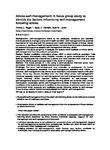Stroke self-management: A focus group study to identify the factors influencing self-management following stroke
| dc.contributor.author | Boger, EJ | |
| dc.contributor.author | Demain, Sara | |
| dc.contributor.author | Latter, SM | |
| dc.date.accessioned | 2019-06-06T16:15:11Z | |
| dc.date.available | 2019-06-06T16:15:11Z | |
| dc.date.issued | 2015-01 | |
| dc.identifier.issn | 0020-7489 | |
| dc.identifier.issn | 1873-491X | |
| dc.identifier.uri | http://hdl.handle.net/10026.1/14264 | |
| dc.description.abstract |
BACKGROUND: Self-management refers to the strategies, decisions and activities individuals take to manage a long-term health condition. Self-management has potential importance for reducing both the personal and health service impact of illness. Stroke represents a significant health and social burden, however there is a lack of clarity about the factors that support successful self-management following stroke. OBJECTIVE: This study sought to investigate the factors which facilitate or hinder stroke self-management from the patients' perspective. DESIGN: Nested qualitative exploratory phase within a mixed-methods paradigm. Data were analysed thematically using Analytic Induction to guide development of themes. SETTING: Participants had experienced a stroke and were recruited from rural and urban community stroke support groups based in the South of England. METHOD: Five focus groups (n=28) using a semi-structured interview guide were conducted. Interviews were digitally recorded and transcribed. FINDINGS: The term 'self-management' was unfamiliar to participants. On further exploration, participants described how self-management activities were helped or hindered. Self-management was viewed as an important, unavoidable feature of life after stroke. Three key themes identified from the data affect stroke self-management: Individual capacity; support for self-management and self-management environment. People following stroke reported feeling ill-prepared to self-manage. The self-management support needs of patients following stroke are currently often unmet. CONCLUSION: Successful stroke self-management consists of features which may be modifiable at the individual level, in addition to the presence of external support and an environment which supports and facilitates people following stroke to self-manage. These findings extend current conceptualisations of stroke self-management. | |
| dc.format.extent | 175-187 | |
| dc.format.medium | Print-Electronic | |
| dc.language | en | |
| dc.language.iso | eng | |
| dc.publisher | Elsevier BV | |
| dc.subject | Stroke | |
| dc.subject | Self-management | |
| dc.subject | Focus group | |
| dc.subject | Analytic induction | |
| dc.subject | Stroke rehabilitation | |
| dc.title | Stroke self-management: A focus group study to identify the factors influencing self-management following stroke | |
| dc.type | journal-article | |
| dc.type | Journal Article | |
| dc.type | Research Support, Non-U.S. Gov't | |
| plymouth.author-url | https://www.webofscience.com/api/gateway?GWVersion=2&SrcApp=PARTNER_APP&SrcAuth=LinksAMR&KeyUT=WOS:000347604600020&DestLinkType=FullRecord&DestApp=ALL_WOS&UsrCustomerID=11bb513d99f797142bcfeffcc58ea008 | |
| plymouth.issue | 1 | |
| plymouth.volume | 52 | |
| plymouth.publication-status | Published | |
| plymouth.journal | International Journal of Nursing Studies | |
| dc.identifier.doi | 10.1016/j.ijnurstu.2014.05.006 | |
| plymouth.organisational-group | /Plymouth | |
| plymouth.organisational-group | /Plymouth/Faculty of Health | |
| plymouth.organisational-group | /Plymouth/Users by role | |
| dc.publisher.place | England | |
| dcterms.dateAccepted | 2014-05-17 | |
| dc.identifier.eissn | 1873-491X | |
| dc.rights.embargoperiod | Not known | |
| rioxxterms.versionofrecord | 10.1016/j.ijnurstu.2014.05.006 | |
| rioxxterms.licenseref.uri | http://www.rioxx.net/licenses/all-rights-reserved | |
| rioxxterms.licenseref.startdate | 2015-01 | |
| rioxxterms.type | Journal Article/Review |


